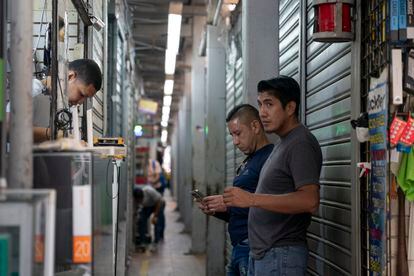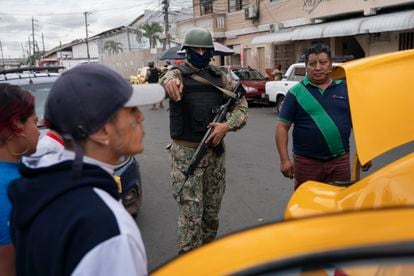First Corporal William, a strong and taciturn boy, like the men of another era, carries a Heckler & Koch rifle on his shoulder. He knows that at the slightest opportunity “you have to kill the enemy.” First he shoots himself and then he wonders. It is the mantra of the Ecuadorian Armed Forces these days. This morning, when the sun beats down, he participates in a checkpoint at the door of a seafood market, Caraguay, which is at the mouth of the port of Guayaquil and smells of saltpeter. Fish vendors dismantle a Christmas tree topped with a crab dressed as Santa Claus. William spots a taxi driver in the distance with tattoos on his arms and stops him. He checks at a glance that they are not eagles or lions, the ones used by members of the most dangerous gangs in Ecuador, the ones that have challenged the State with bombs and assaults on hospitals, and he lets them go. The taxi driver, before accelerating, says through the window:
—Go to Pablo Neruda Avenue, above the iron factory. The lizards are there.
-What do they do?
—They ask the drivers for money. If they don't give, they kill them. They asked one for $1,000!
In Guayaquil – the most populated city in the country, open to the sea, which makes it a strategic place for drug trafficking – confusion reigns. The president, Daniel Noboa, declared a few days ago that the nation is at war since the two main criminal gangs, Los Choneros and Los Lobos, took control of the prisons and took to the streets to cause chaos.
It was a demonstration of the strength that they have been accumulating over the last five years, in which they have taken over ports, entire neighborhoods, businesses and fleets of taxi drivers. Along the way they have infiltrated the main institutions: they have judges, police officers, generals, prosecutors and congressmen on their payroll. They order the killing of presidential candidates and councilors who are not related to them. In their areas, the morgue van does not enter to collect the bodies until it receives authorization. Sometimes the family itself lifts the dead person and buries it in a pine box, without any death certificate being recorded. A ghostly light covers these neighborhoods forbidden to the rest of mortals.
Gustavo López—22 years old, black t-shirt, cap pulled down—lives in Durán, the most dangerous municipality in Ecuador. His mayor lives in hiding, in exile, aware that a death sentence hangs over him. A few months ago, one of his councilors was kidnapped and days later he was found dead and tortured. No ransom was requested. The Chone Killers and the Latin Kings fight with bullets in every corner of this place. Gustavo barely goes out into the street, only to go to the store to buy some beers and come back. He is surprised when he sees boys who as children played soccer together kill themselves in a small dirt field. He never wears a helmet when he rides a motorcycle in case someone mistakes him. He has a tattoo that means “loyalty” in Japanese.
These days when authorities check for engravings on the skin, anyone who has one becomes a suspect. He says that if he stops him the police will give them his cell phone so they can check it. His brother, who six years ago got a tattoo of a lion and an eagle, when that meant nothing, he doesn't step on the door step. Gustavo, on the other hand, has reopened his telephone repair stand: “With God's blessing and faith we go out to work.”
For 72 hours, Guayaquil seemed like a ghost town. Shops closed and people took refuge in their homes. At night, with the curfew from eleven at night to five in the morning, the avenues look deserted. Only essential workers — doctors, garbage collectors — and airport taxi drivers can leave. The police in charge of ensuring tourism have taken over the hotels, which have a metal detector at the door. Ten police officers guard the entrance to the Hilton and three others monitor from the roof. An army has been stationed in front of the house where the president, son of the richest businessman in the country, Álvaro Noboa, lives.

—Is this the president's building?
—This one and the one next to it are yours. Well, actually all of Ecuador is yours.
A member of the Navy jokes, hiding his face behind a balaclava. On her forehead she wears a GoPro camera. The president has asked the military to take charge of security, given the lack of effectiveness of the police. The uniformed officers patrol with long weapons, aboard convoys. They scare criminals, but also citizens, who know that they are trigger-happy. In the last 24 hours, in the center and south of Guayaquil, three alleged members of Los Lobos were arrested, who, apparently, recognized their affiliation to the gang. The night was busier in Quito, where a motorist attacked a police station with explosives.

The authorities have proposed to recover the prisons, where, from time to time, riots occur with dozens of deaths. The inmates kill each other with knives for control of the wards. The decapitated heads of the losers end up in the toilet. From there, as contradictory as it may seem, the gangs govern the country's organized crime. The murder of Fernando Villavicencio, an investigative journalist who had brought to light the relationship between politicians and criminals, was planned in a cell during the electoral campaign. The two bosses of Los Choneros and Los Lobos, José Adolfo Macías Villamar, alias Fito, and Fabricio Colón Pico, escaped from prison days ago. It is presumed that they left through the prison door, with a red carpet. Noboa has said that they will try to regain control, with blood and fire if necessary. The last two presidents promised the same thing, without any success.
At the seafood market, where live crabs are sold in bunches, no one says anything. Hearing the boots of the military there was silence. The fishermen and vendors remain silent behind their aquamarine tiled stalls. It is no secret that gang members arrive every Saturday, at four in the afternoon, to collect money.to vaccine, extortion. To rebel is to put a rope around your neck. In April of last year, a commando of 30 hitmen murdered nine fishermen with a hail of bullets, who fell dead next to their nets and boats. Homicidal fury has taken Ecuador. People witness in disbelief, live and direct, before the eyes of the world, the decomposition of an entire country.
Follow all the international information on Facebook and xor in our weekly newsletter.
Subscribe to continue reading
Read without limits
_
#Unchecked #violence #Guayaquil #ghost #city #army #watches #tattoos
